“Rajasthan High Court Convicts Individual for Outraging Modesty, Acquits on Attempted Rape Charges Involving Removal of Minor’s Undergarments”
May 23, 2024 2024-07-05 14:49“Rajasthan High Court Convicts Individual for Outraging Modesty, Acquits on Attempted Rape Charges Involving Removal of Minor’s Undergarments”

“Rajasthan High Court Convicts Individual for Outraging Modesty, Acquits on Attempted Rape Charges Involving Removal of Minor’s Undergarments”
By Shazia Siddiqui
In a recent ruling, the Rajasthan High Court revisited a case from 1991 involving the attempted sexual assault of a 6-year-old girl in Todaraisingh, Tonk district, which has prompted widespread public debate and concern. The incident occurred when the child was forcibly taken to a nearby dharamshala by the accused, Suwalal, who removed her underwear and disrobed with the apparent intent to commit rape. The trial court initially convicted Suwalal under Sections 376 and 511 of the Indian Penal Code (IPC) for attempting to commit rape, leading to his sentencing. However, on appeal, the High Court revised this conviction. The court determined that the actions of undressing the girl and himself did not meet the criteria for an attempted rape under the aforementioned sections. Instead, the court reclassified the offense under Section 354 IPC, which pertains to outraging a woman’s modesty.
The rationale behind this decision hinged on the legal interpretation that an “attempt to commit rape” must involve clear, direct actions towards executing the crime, surpassing mere preparation. The court explained that such actions should constitute a deliberate step beyond intent and planning, something which, in their view, Suwalal’s actions did not sufficiently demonstrate. In delivering this judgment, the court referenced similar cases such as Damodar Behera v. State of Odisha and Sittu v. State of Rajasthan, where disrobing and attempting physical relations were deemed sufficient to constitute attempted rape. However, the court found that these precedents did not fully apply to Suwalal’s actions because the necessary criteria for attempt, particularly the execution phase, were not met.
This judgment has sparked significant controversy, with critics arguing that such a narrow interpretation could potentially weaken legal protections for victims, particularly minors. Social activists have expressed deep concern, suggesting that this decision might embolden offenders and reflects a dated, potentially anti-women perspective within the judiciary. One activist pointed out that considering the removal of undergarments as insufficient for an attempt to rape could lead to an increase in sexual harassment incidents and demonstrates an insensitivity to the gravity of such actions. Legal scholars have also highlighted the disparity in penalties between outraging modesty and attempted rape, advocating for a modernized interpretation of the IPC that aligns with contemporary societal standards. They argue that the outdated provisions of the IPC, dating back to 1860, need to be applied with consideration of today’s social realities to ensure justice and protection for victims.
This case, pre-dating the Protection of Children from Sexual Offences (POCSO) Act of 2012, underscores the limitations of previous legal frameworks in addressing sexual offenses against minors. The POCSO Act, established years after this incident, provides a more stringent and comprehensive approach to protecting children from sexual abuse. Legal experts and activists emphasize that under the POCSO Act, actions like those committed by Suwalal would likely attract much harsher penalties due to the Act’s zero-tolerance stance on child sexual offenses. The Act broadens the scope of what constitutes sexual crimes against minors, including non-consensual touching, making sexually suggestive comments, and other forms of sexual exploitation, and enforces severe punishments to reflect the seriousness of these offenses.
Dr. Shailendra Pandya, a child rights activist, notes that prior to POCSO, many acts of sexual misconduct involving minors were inadequately addressed under the IPC. He highlights that POCSO’s provisions ensure comprehensive protection by addressing a wide range of sexual crimes against children, ensuring justice for victims, and imposing stringent penalties on offenders. This evolution in the legal framework reflects a significant shift towards prioritizing child protection and responding effectively to the complexities of sexual offenses against minors.
The ruling in Suwalal v. State serves as a critical juncture in the ongoing discussion about how legal systems should evolve to protect minors from sexual offenses. While the court’s decision was rooted in a strict interpretation of existing laws, it highlights the gaps that existed prior to the enactment of the POCSO Act. The case underscores the importance of contemporary legal reforms and the need for continued vigilance and sensitivity in judicial interpretations to safeguard the rights and safety of minors effectively. This judgment emphasizes the necessity for a legal system that evolves with societal needs, ensuring robust protections for the most vulnerable and delivering justice in line with modern expectations.
Case Title: XYZ v State of Rajasthan
Citation: S.B. Criminal Appeal No. 272/1991









